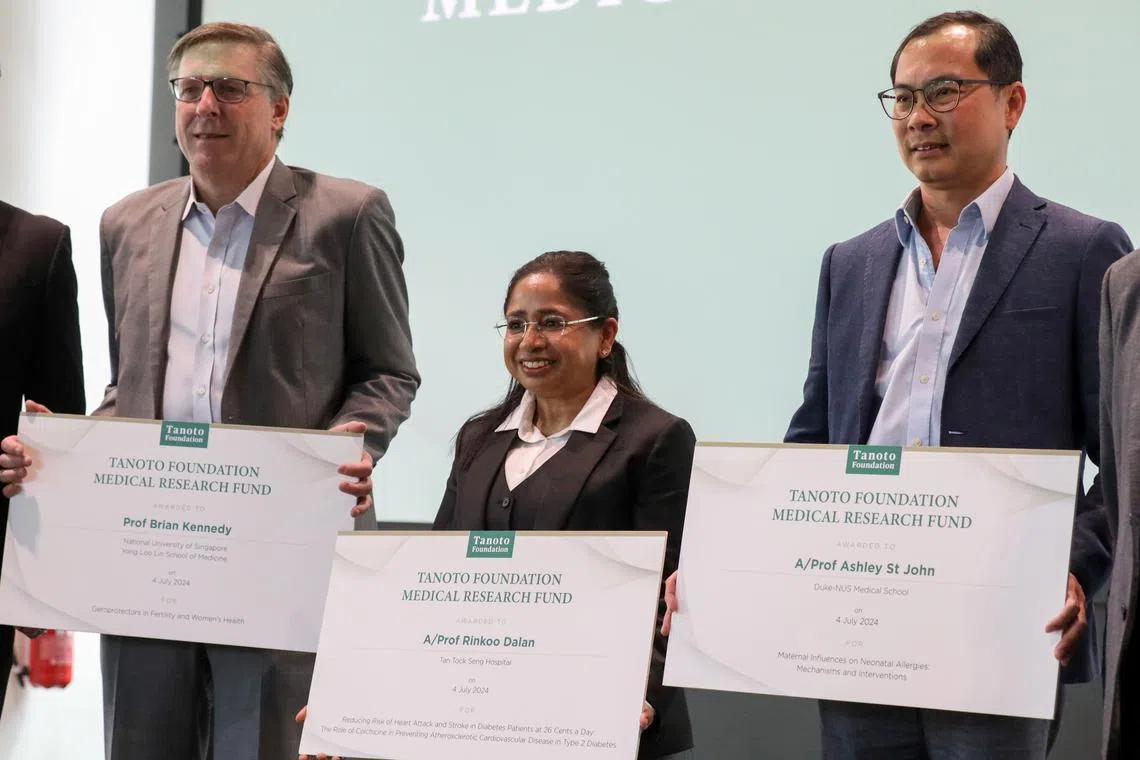$5m awarded to studies on maternal and child health, cardiology
Sign up now: Get ST's newsletters delivered to your inbox

(From left) Professor Brian Kennedy from NUS, Associate Professor Rinkoo Dalan from Tan Tock Seng Hospital and Professor Jerry Chan, representing Associate Professor Ashley St John from the Duke-NUS Medical School.
ST PHOTO: LUTHER LAU
Follow topic:
SINGAPORE - Three research projects, including one looking into delaying ovarian ageing to extend fertility, were awarded the inaugural Tanoto Foundation Medical Research Fund on July 4.
They will receive up to a total of $5 million from the fund, which was launched in 2023 to support research that will look into a range of medical issues and diseases prevalent in Singapore.
Professor Chong Yap Seng, dean of the Yong Loo Lin School of Medicine and one of three panelists at a forum discussion, said philanthropic organisations can help accelerate research here by funding studies that have the potential to impact a large segment of the population, but are underfunded, such as ageing health.
The grant for the three projects is for a period of three years, from 2024 to 2027.
The forum, held on July 4, discussed the importance of philanthropic funds’ impact on medical innovation.
Tanoto Foundation’s chief executive Benny Lee told The Straits Times that it wants to help propel promising research to the next stage.
The foundation, founded by Indonesian billionaire Sukanto Tanoto and his wife Tinah Bingei Tanoto in 1981, will set aside up to $5 million to fund medical research every year, and will be launching the next grant call in September, he said.
Here’s a quick look at the three research projects that received the grant.
Delaying ovarian ageing to extend fertility
Principal investigator: Professor Brian Kennedy from the National University of Singapore
Prof Kennedy, who is also the director of the Centre for Healthy Longevity, National University Health System, said the project will include studying whether certain ageing-related drugs will improve fertility and general well-being of aged female mice, before the research can be tested in humans one day.
Maternal fertility declines due to ovarian ageing, which starts when women are in their 30s.
With ovarian ageing, there is also an increased risk of age-related reproductive disorders, such as diminished general well-being due to hormone loss, miscarriage and chromosomal abnormalities in offspring.
If ovarian ageing can be delayed, more women will still be able to give birth when they are older, around 40 to 45 years old.
For instance, if the research can show that a particular drug, called rapamycin, can help make the ovaries last longer, this can help extend fertility.
And, even if it does not extend fertility, the impact of prolonging ovarian functions is substantial because it protects against menopause, which drives a lot of diseases, said Prof Chong.
Reducing risk of heart attack and stroke in diabetes patients at 26 cents a day
Principal investigator: Associate Professor Rinkoo Dalan from Tan Tock Seng Hospital
This will look into repurposing an existing generic low-cost medication (26 cents a day), known as Colchicine, for the prevention of atherosclerotic cardiovascular disease events – heart attacks and strokes – in those living with Type 2 diabetes.
Colchicine has been used for years to treat gout as an anti-inflammatory medication.
Diabetes is a major risk factor for cardiovascular disease and is the most common cause of death in adults with Type 2 diabetes.
Prof Dalan, a senior consultant at the hospital’s department of endocrinology, said high blood sugar and other comorbidities that occur in people with diabetes eventually lead to a kind of low-grade inflammation throughout the body. Some patients have a higher grade of inflammation, which puts them at higher risk of having heart attacks and strokes.
She said she and other researchers have been studying ways of measuring the inflammation. The hypothesis is that if they find patients with a higher amount of inflammation and use Colchicine to help target the inflammation, it will have downstream effects on the risk and progression of atherosclerosis, she said.
Prof Dalan said they will be embarking on a randomised controlled trial to study the impact of Colchicine on the progression of atherosclerosis, by measuring artery thickness, markers of inflammation and other vascular function.
Whether it will help prevent a heart attack or stroke will require a larger, longer trial, she said.
Preventing the initiation of neonatal allergies
Principal investigator: Associate Professor Ashley St John from Duke-NUS Medical School
This research looks into why and how infants often develop allergies to the same allergens as their mothers. This will pave the way to the future development of potential therapies to prevent the initiation of neonatal allergies.
Allergies affect about 10 per cent to 30 per cent of the global population, with increasing prevalence in South-east Asia. Some children can be severely impacted. For example, atopic dermatitis has been associated with sleeping difficulties and exhaustion for the first decade of childhood, while food allergies can lead to malnutrition.
There are currently no known strategies to prevent the initiation of allergic responses.
There are also few options available for infants and young children for alleviating allergy symptoms.


